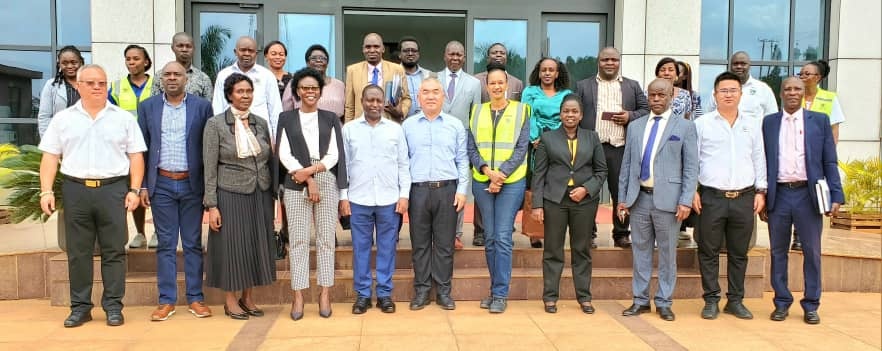21 June, 2024On 19 June, a tripartite meeting at Sino-Uganda Mbale Industrial Park strategized how to initiate social dialogue to make employers comply with national labour laws and decent working conditions.
During the meeting, the ministry of labour agreed to conduct an inspection on workers’ rights violations through questionnaires which the employers are required to respond to in 30 days. The employers also made a commitment to immediately provide personal protective equipment to workers. On their part, unions will develop recognition agreements and begin their engagement in social dialogue with employers in the Sino-Uganda Industrial Park.
Sino-Uganda Mbale which has more than 50 factories, employs thousands of workers in manufacturing sectors that include textiles, electronics, glass, and soap making. The unions recommended that the Uganda Investment Authority should make compliance with labour laws a condition for investing in the country.
The meeting, which included factory visits, took place between unions, ministers, government officials, members of parliament for workers, employers, and local authorities, and came after unions had petitioned the government over workers’ rights violations and decent work deficits. The violations highlighted in the petition in May included unfair dismissals, long working hours, and unpaid overtime. The unions wrote that most of the companies at Sino-Uganda Mbale promoted precarious working conditions, “with heavy casualization of labour which included piece rates, short contracts, low pay, and no appointment letters.”
On health and safety, the unions said the companies failed to provide personal protective equipment and adequate accident prevention measures. Gender-based violence and sexual harassment were common with women workers being denied maternity protection.
Sino-Uganda Mbale, located in East Uganda, is a joint China-Uganda project whose construction was done by the Tian Tang Group and is part of China’s “One Belt One Road” initiative.
Participating in the meeting were ministers of state financing and economic development, labour, industrial and productivity, and trade, industry, and cooperatives. Workers MPs, who are elected by trade unions as per Uganda’s Constitution also participated at the meeting.
Last month, IndustriALL Global Union affiliates, Uganda Textile, Garment, Leather and Allied Workers Union (UTGLAWU), Uganda Printers, Paper, Polyfibre and Allied Workers Union (UPPPAWU), Uganda Chemicals, Petroleum, and Allied Workers Union (UCPAWU), Uganda Hotels, Food, Tourism, Supermarkets, and Allied Workers Union (UHFTAWU) petitioned the government expressing concerns on violations of freedom of association and collective bargaining especially the workers’ right to form and join trade unions. The affiliates are also members of the federation, the National Union of Trade Unions (NOTU) which participated at the meeting. The union rights’ campaigns are supported by the Danish Trade Union Development Agency (DTDA), and the Norwegian Society of Graduate Technical and Scientific Professionals (TEKNA).
“Most of the employers are refusing to recognise unions, which is a constitutional right, thus denying workers the right to collective bargaining and decent work. This violates International Labour Conventions 87 (Freedom of Association and Protection of the Right to Organize) and 98 (Right to Organize and Collective Bargaining),”
said Hajj Twaha Sempebwa, chairperson of the IndustriALL national council for Uganda. He further added that this contradicts Uganda’s national action plan on business and human rights which states that employers must respect workers’ rights and promote decent work.
“Industrial parks should not be enclaves of workers exploitation that offend national and international labour standards. We are in solidarity with Ugandan trade unions on their calls for social dialogue to ensure compliance with labour standards to improve industrial relations,”
said Paule France Ndessomin, IndustriALL regional secretary for Sub-Saharan Africa.




